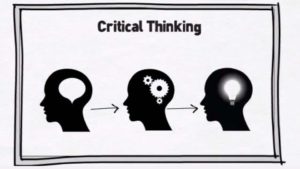
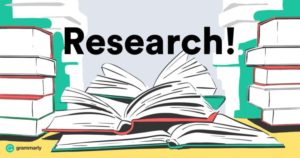
Critical Analysis
Can students succeed without parental involvement?
Academic success is crucial among students. There are many positive outcomes that can stem from succeeding in education. When students succeed academically they take their success to the outside world. Students succeed in the outside world with a sense of being purposeful, inquisitive, and having a grasp of knowledge about important life skills.The underlying question society has is whether parental or familial involvement is pivotal in the academic success of students, and how that comes into play in a student’s life. Parental involvement in a student’s life is crucial but only to a certain point. Libraries, and after school programs that are dedicated to helping students don’t necessarily have to involve parents to make sure students are academically successful. Academic success can stem from no parental involvement and program staff being the ones making sure students diligently work towards academic success.
Libraries are nobly known as a place where people can cultivate their reading skills, immerse in quiet study, and be of essential educational wise. The Library Journal stated that the National Advisory Commission of Libraries which was chosen by President Johnson in 1969, made it a goal that libraries would benefit the public in every way possible. Some examples of how libraries would benefit the public includes helping the public educationally, occupationally, socially, and culturally without questioning the economic, personal, and social status of anyone. To further improve libraries, Louis Shores, an important figure in the sixties who was also a huge supporter for academic libraries, required librarians to help students as part of their work. To further the beneficial increment of libraries, after the launch of Sputnik in 1957, America expressed the importance of studies in math and science in schools, and libraries around the U.S. were funded sufficiently (Berman, Sanford 1969). Librarians cultivated programs in order to meet the academic needs of students. Various programs such as homework help, reading, and much more have been established with the further desire to better library services. Despite the government, and its efforts to be helpful to students, there has always been a question on whether or not libraries can help students alone, or whether parents also need to do their part. To support parental involvement, Campbell-Hicks a local librarian, claims that it is crucial for libraries to involve parents and caregivers by encouraging them to talk, play, sing, and read more with their children in the first years of their lives (Campbell-Hicks, 2016) She believes that children who are behind in early literacy skills struggle to catch up throughout their schooling and into their adult lives. Notwithstanding her belief that parents have to talk, play, and more to help their children in reading, Campbell goes to say that parents and families can not teach their children alone. She believes that the help of library programs, and services aid them significantly. \
Above all, and on the contrary of Campbell’s first claim, libraries do not need parents to be involved in order for them to effectively help students succeed academically. No parental involvement does not equal academic failure. My observations at the Fordham Library recently solidified this claim. As a covert observer during this first observation, I walked outside the glass door and pretended to read the signs. Instead of reading the signs, I looked through the glass, and saw see the teacher write on the board, and it seemed that these people who ranged in different ages were learning English. While the teacher continued to teach, I observed how a majority of people were listening intensively. While I was about to exit the library and finish up my observation for the day I saw a teen girl offer to write on the blackboard I felt pride that she, and others in the room were taking advantage of the opportunities the public library gives to the public. That young girl who took advantage of the library programs to learn English is the epitome of someone who can succeed academically bereft parental involvement. She took charge, because she knew that if she didn’t do everything in her power to learn what was there to learn for the day, she would never reach her goal of becoming a fluent English speaker. In all honesty, this young lady, did it all by herself, and she had no parent by her side to push her. All she had was dedicated librarians and her willpower. This observation reinforces my claim, that the absence of parental involvement, does not equate the downfall of students. If parents are not there, the staff will uplift, and guide students.
Two days later I decided to observe overtly to see whether my claim could be feeble. I saw someone who may work for the library. He told me that he works with the public library to provide homework help to high school students, and also check their progress reports. I watched him set up four tables, and I also observed that there is a printer on top of a computer cart to help students print. At 3:17 pm, and no student showed up. Of that 40 minutes I waited only two students came to utilize his help. One Hispanic girl about the age of 15 came, and he asked her “What’s going on?” She told him that she is struggling with math. Mr. Shawn, whose name I heard a student who came later dictate, proceeded on telling her that there has to be a way he could help her improve. In fact, he prompted her to think of topics that appeared in previous exams so he could later go over them with her. He gave her about three hours to do homework which was plenty of time, and it looked like the homework help, and his attention would be one on one since not many students showed up . This scenario that I witnessed illustrates that a caring staff is able to provide the same academic support an absent parent could effectively.
Library programs like the ones I observed with the center reading and writing, and Mr. Shawn’s homework help showcase some of the numerous programs that are available to the public. Dedicated students worked with program staff and parents were nowhere to be found. For example, The two girls who were helped by Mr. Shawn while I was observing didn’t have their parents sitting behind them. They each took the torch to get the help they needed and to take advantage of the opportunities offered to them. Without doubt, the people who were learning English are the embodiment of the fact that students or anyone generally can succeed without parental involvement. The only visible entities that ensured academic success for those who took advantage of the programs were programs, and dedicated people who ran the program, but parents were nowhere to be found.
There’s also been a question on whether after school programs play a big role in academic success for students and whether parental involvement is also necessary. Eva L. Baker (2007) a prominent Professor at the University of California, states that good after school programs help students with homework, engage students in their community, keep children safe, provide intellectual, and social enrichment, and more. Like library programs, after school programs also don’t necessarily need parental involvement to make sure children succeed academically. I observed the Madison Boys and Girls Club Joel E. Smilow clubhouse, an after-school program for nearly three hours to come to this conclusion. At the official start of homework time, a staff whistled for quiet among the still talking children. A majority of students started to open their bags, but with no rush and were reluctant to start their homework. A handful of kids even said that they received no homework at school for that day, and didn’t bother to open their bags. Even when they claimed they had no homework, staff had reading books available and problem sheets for them to solve. A few kids ages 10-13 folded their arms across their chest with sullen expressions. Some kids pretended to do homework or read, but when the staff turned their back on them, they started talking to one another. The staffs had to threaten them that they won’t have a chance to go to the swimming pool for that day which was an indoor pool in the after school building. At the end of the homework hour, otherwise known as “power hour” was done, some kids remained still because they no longer had the opportunity to go to the indoor pool for the day. At the end of the when it was dismissal time, parents or guardians were not notified if their child completed homework for the day or were not notified whether their child said they didn’t have homework. They weren’t involved at all, but this didn’t stop the after school program from helping students with their homework or ensuring that they finished it. The after school made it their initiative to get students on track with their homework for the time being.
The Madison Boys and Girls Club’s strategy for making sure students finish their homework during the homework time allotted for them is really effective. Students didn’t need parent’s tracking whether they had homework in order for them to use their time wisely. The staff were in charge during this time. They used a clever strategy of revoking swimming pool time from those who failed to abide by the rules, and not do their homework or do anything that aided them academically.
On the other hand, other people believe that parental involvement in anything academically related is crucial. They believe that if parents and families are involved, students will be monitored so they can do well academically. They back up this claim with the research of the British Journal of Special Education. It has been researched by the British Journal of Special Education, that family engagement in school improves student achievement, reduces missed days, and more. Students with involved families score higher on tests, earn better grades, behave well, and succeed in social settings.(Sheppard, Anne 2009) This research unmasks how parental involvement could ensure academic success for students. Parents take the initiative to track their student’s progress as a baton to ensure their students are on track, and as Garcia, Lily E., and Otha Thornton from Nea Today, an organization for future teachers claim, this initiative taken by parents enables them to do anything and everything in their power to make sure their child has the resources they need to get the top education possible. (Garcia, Lily E.,Thornton. 2014) Their claim is a testament, that goes to show that it’s possible that when involved parents are behind programs that help their children academically, their child will never go astray academically.
Involvement of families will push students to work harder academic wise, however stringent patrol of parents on their students could also be detrimental. Children can easily go astray academically even when parents are involved, and this is why students don’t need parental monitoring them academically in order to ensure academic success. If parental involvement isn’t there, programs that help students can still function, because they don’t depend on parental involvement. In my two observations, parental involvement was absent, but students did what they had to do academically, or they had someone else making sure that they did. As seen in my observations, students were urged to get what they had to do academically done under the fear of having privileges revoked from them or they had a number of support from program staff. There’s nothing special about parental involvement that leads to academic success because other people can also help students succeed academically.
In conclusion, the world needs to know that students will not always benefit with families having their back, and being involved, it’s the intensity of the programs and the help programs offer in the absence of parents that makes the students succeed academically. Parents can be absent and students won’t experience a downward spiral in their academic life, because the support provided by caring program staff in programs such as after school programs, and library programs will keep them uprooted.
Self Reflection
Writing the Critical analysis was one one of the hardest essays I have written this semester, because it required a lot of deep analysis, and I had to prove my point. It’s always the norm to prove that students succeed academically when parents are involved even though teachers might also be involved academically. I wanted to prove that even if students don’t have familial involvement or parental involvement they could still succeed academically with the help of teachers. It was hard arguing for a claim the majority of society would go against. I provided my claim, evidence, rebuttal, and counter argument to my best ability to persuade my audience.
While trying to make my point that students don’t need familial involvement or parental involvement, because they can still succeed academically with the help of teachers, I did my best to incorporate the rhetorical situations effectively to my full honest potential. I was motivated the hardworking students at the library, both adult and children who took advantage of the programs provided to the public by the library. I was also motivated by the diligent children at the after school I observed, who took advantage of the homework hour to get their work done. Both the population in the library programs, and after school homework program asked for help, and received help from caring staff, and teachers. They didn’t have parents involved, but they were able to succeed academically by getting their work done, receiving academic support with staff by their sides. I was targeting a general audience, and people in society who highly agree that only parental involvement helps a student succeed, and that with the absence of parental involvement, students would perish academically. Although my critical analysis wasn’t a speech but a argumentative essay, I wanted my words to influence my readers and resonate with them. Because I wanted to effectively get my point across that the absence of parental involvement doesn’t equal academical downfall for students, I made sure to state the other side, and refute it, and make my claim seem stronger.
I read a variety of literature during my writing process that were really helpful to me while I was writing my essay. I really took away from “ They say/ I say chapter 7 So What? Who cares”, “They say/ I say chapter 8”, and “Caught Between the Ages from Down to Earth Sociology” by William Van Dusen Wishard. After reading “They say/ I say chapter 7” I was equipped with the knowledge that I had to share why what I’ve shared in my critical analysis essay matters, and how it may apply in the real world. Chapter 7 also told me that I had to target an intended group, or person who cares about my claim. After reading “ They say/ I say chapter 8”, I knew that it was important that I connect sentences in a logical way. I had to make sure that my previous sentence connected with the next one. William Van Dusen Wishard’s reading also demonstrated what I had to do in order to ensure that the structure of my argumentative essay was an effective one. Wishard took his argument, built it with academic sources, and then supported his argument. While writing I tried to incorporate what I had read about in my essay, and I also tried to cover the who, what, where, how, and why of what I was speaking about in my essay while arguing my claim. I was having a hard time introducing my counterclaim. I made a separate paragraph for it, but a transition word was missing. One of my peers and Professor Rodwell helped me choose “however”. This made my counterclaim paragraph better, and my essay better. When it came to recognizing rhetorical terms and strategies which also made my essay better, I tried to cover them effectively. I made sure to target a audience who believe that students can not be successful students if parents are uninvolved in the academic career of students. When I targeted them, I was motivated to persuade them that students can have academic support from elsewhere. Although the genre of my writing wasn’t a speech but rather an argumentative essay, I tried to make sure that my words jumped out at my readers, by stating my claim, using my observations as evidence, then further analyzing my observations to prove my point. For the design of my essay, I designed it in such a way that I could create logic in my words so my argument could make sense. In order to make sure that my argument made sense, I first had to research, and I used academic journal articles, and general articles from City college’s databases. I also used credible websites for my research. I cited every website I used and did a annotated bibliography on them.
I felt like I got my point across to the best of my ability. There is always room for improvement in everything, and I feel like I could’ve argued my points further If I did more than three observations at my sites. When I get back my essay, I will take Professor Rodwell’s comments and improve my writing further in my future essays throughout my college career.
Supporting documents
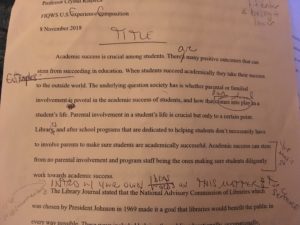
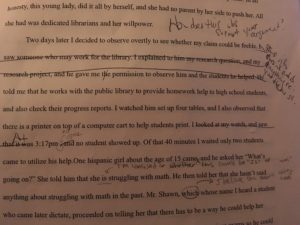
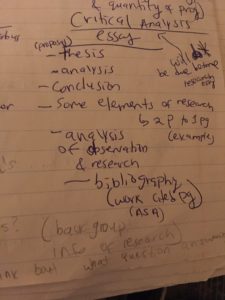
What I learned:
- I had to use my example and observations of my research site to support how my claim is supported.
- When editing my critical Analysis essay, I had to avoid fluff.
- From my interpretation of “They say/ I say chapter 7” I was granted the knowledge to share why what I’ve shared in my critical analysis essay matters, and how it may apply in the real world. Chapter 7 also told me that I had to target an intended group, or person who cares about my claim.


